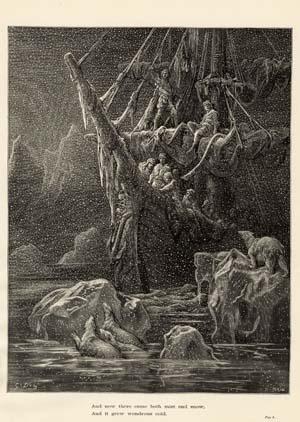 |
| Illustration to 'The Seafarer', by Jila Peacock. |
It's almost Christmas time, and at Christmas I always find myself thinking of Old English poetry. Don't you?
Forþon him gelyfeð lyt,
se þe ah lifes wyn
gebiden in burgum,
bealosiþa hwon,
wlonc ond wingal,
hu ic werig oft
in brimlade
bidan sceolde.
Nap nihtscua,
norþan sniwde,
hrim hrusan bond,
hægl feol on eorþan,
corna caldast.
('Indeed he credits it little, the one who has the joys of life, dwells in the city, far from the terrible journey, proud and wanton with wine, how I, weary, often have had to endure in the sea-paths. The shadows of night darkened, it snowed from the north, frost bound the ground, hail fell on the earth, coldest of grains.' Full poem and translation here.)
What the author of the poem - presumably an Anglo-Saxon sailor of the tenth century - cannot forget about his time at sea is the terrible cold. 'Calde geþrungen / wæron mine fet', he writes: 'my feet were fettered with cold', either because they were so numb that he couldn't move them or because they were actually, physically frozen to the deck. He has been 'bihongen hrimgicelum' ('hung with icicles'), out on the 'iscealdne sæ' ('icecold sea'); he has heard the cry of the freezing tern, 'isigfeþera' (ice-feathered'), and the sound of the 'iscaldne wæg' ('icecold wave'). But he knows that the people who have 'lifes wyn' - the people who have 'won at life', as we might say today, the people who live in cities and have warm houses to sleep in and decent wine to drink - will hold his story 'lyt', or lightly, barely able to imagine what it was like on-board his ship when 'Nap nihtscua, norþan sniwde, hrim hrusan bond, hægl feol on eorþan'.
 |
| SO FUCKING COLD. |
In D&D, a lot of attention gets devoted to spectacular bodily injury: getting whacked in the face with axes, splattered with acid, shot full of arrows, incinerated by fireballs, and whatnot. The lower-level discomforts of adventuring life - the cold, the pain, the hunger, the exhaustion, the constant anxiety, and so on - are more likely to get glossed over. To a certain extent, that's perfectly reasonable, because the PCs probably don't pay much attention to them either. Most of the characters in my current game, for example, started out as medieval serfs, and as such I assume that conditions which I would find almost unbearable probably strike them as being completely ordinary: for them, being wet and tired and cold and hungry is just what normal life is like. Besides, they're PCs, and PCs are crazy bastards almost by definition: the kind of Mungo Park types who will plunge into the most inhospitable terrain in the worst possible weather just to see what's on the other side of it, utterly undeterred by their expedition's 90% + death rates along the way.
Even so, however, I think there's something to be said for not ignoring these sorts of discomforts entirely. One thing that comes across very powerfully in a lot of military campaign memoirs is just how much time and attention soldiers on campaign devote to trying to stay warm, dry, and decently fed. Dry firewood, extra food, thick socks, decent blankets: for the footslogger on a long march, or the squaddies holed up in a muddy trench waiting for the next big push, these things are like gold dust. That tenth-century Saxon sailor, standing watch on the deck of a wooden ship, at night, in the North Sea, in winter, in the middle of a fucking hailstorm would probably have traded almost anything for a warmer coat and a genuinely waterproof pair of shoes. So if you're out there, in the wilderness, surrounded by potential enemies and looking for any kind of advantage that you can scrape together... well, that's the sort of thing that you can use.
 |
| Mungo Park, last seen diving into the Niger River while the locals threw spears at him. He had forty-four followers. One survived. |
In D&D terms, the easiest way to model this is through follower morale, doling out bonuses for PCs who take the trouble to keep their followers warm and dry and well-fed, and penalties for the reverse. This can also be applied to NPCs, which means that clever PCs can weaponise it: parties who can force their foes to fight them while cold and tired and hungry and miserable should be rewarded by giving their enemies penalties to morale. Reminding PCs that not everyone is like them, and that both their followers and their enemies would really prefer to have a warm meal and a decent night's sleep once in a while, can lead to some interesting situations, as the kind of mundane items which usually get ignored as irrelevant (looted tents, blankets, coats, shoes, and firewood, for example) can suddenly become the focus of intense attention. Which lucky hireling will be rewarded with the only really waterproof hat, for example? (And just how much will the others resent her for it?) Is it worth launching an attack on the bandit camp, despite the potential loss of life, simply in order to get hold of their supply of dry firewood? (After a week of marching miserably through heavy rain, your followers probably think it sounds like a great idea!)
This sort of thing should never become a requirement - most people play D&D for fantastical adventure, not because they want to fret about how to find enough blankets to outfit their adventuring party - but in moderation, I think it can be quite a good thing. It helps to emphasise that situations don't always have to be resolved through the D&D trinity of magic, gold, and violence: that in a world as horribly uncomfortable as most D&D settings, you'll often be able to build alliances just by providing people with food and warmth and shelter, and to cripple your enemies by taking those things away. It ties back to romantic fantasy ideas I've written about before, in which the contributions of 'ordinary' people (cooks, foragers, tailors) can actually make a much bigger contribution to the overall success of a mission or a campaign than some fucker who just grants everyone a +1 bonus to hit. (Ask soldiers in the field whether they'd rather have a 5% increase in weapon accuracy or a warm dry place to sleep at night and I'll bet the vast majority would pick the latter.) And, perhaps above all, it gives you a way to highlight how tough and remarkable and crazy the PCs are. If you depict a world in which most people care a great deal about staying warm and dry and fed, then when the PCs inevitably proceed to give no fucks about any of it, then... well... that demonstrates why they're the PCs, doesn't it?
Just make sure you come up with some good house rules for frostbite...
Alexis Smolensk has some good rules on maintaining body temperature in the cold (his CLO rules).
ReplyDeleteIt doesn't take much to get trench foot.
ReplyDeleteWow, you pretty much just convinced me to start paying some real attention to follower moral, very well put. My PCs will have to buy something other than biscuits for their crew next voyage!
ReplyDeleteFollowers' morale is a great idea for including harsh conditions in a game! I thought about many different ways you can put it into a game and every one of them is worse.
ReplyDeleteI don't know much about the ways D&D deals with "discomfort", but as a huge fan of Torchbearer I have a few ideas as to how this could look like:
ReplyDeleteAfraid (like really fucking afraid) - decrease your effective level (but not HP) by 1; being afraid seriously affects your mental capabilities
Exhausted - DC +5 (or equivalent malus); being exhausted makes everything more difficult
Injured - DC +10 (or equivalent malus) to every action that requires the injured body part, +5 for any action that would induce pain to that body part, decrease HP by 1/6
Hungry/Thirsty - DC +5, also makes recovery from other conditions more difficult, decrease HP by 1/6
Sickness (I assume something like the common cold or diarrhea) - DC +5, makes recovery more difficult, you can not level up or learn something new while being sick, decrease HP by 1/6 (really mean if the sickness also progresses, from a cold to pneumonia or from diarrhea to dehydration, exhaustion and blood loss with consecutive worsening and the possibility of death)
I don't know the Torchbearer system, but I try to avoid coming up with heaps of status effects to track unless I have to. The need to keep track of the fact that Bob was Shaken and Kate was Sickened and Mike was Fatigued was the kind of thing which drove me from D&D3.5 to OSR D&D in the first place!
DeleteIf I gave this sort of thing any mechanical form beyond morale modifiers, it would probably be in the form of a unified 'misery rating', which rolled together all these lesser discomforts into a single index. Day's march in heavy rain? Add two misery. Good night's sleep in warm blankets? Drop misery by one. Then just assign mechanical effects to certain thresholds...
What would the difference between high misery, high morale and low misery, low morale be? Aren't the two mechanics basically tracking the same thing in opposite directions?
DeleteAlthough I suppose that from a storytelling perspective, the difference between people following a leader they adore on a mission they believe in through hell, high water and privation and a group of well-cared-for mercenaries who are following because they trust their leader to take care of them might be interesting.
Well, high misery would need to have consequences other than morale penalties. Otherwise you'd just use morale modifiers and have done with it. It's simply a halfway measure between Philipp's suggestion (track effects from every condition separately) and my own preferred solution (just assign a morale modifier): it gives you consequences other than morale damage, but relieves you of the burden of having to remember that Bob is cold but not tired, Kate is tired and hungry but not cold, and so on.
DeleteWell, in Torchbearer those discomforting conditions are an integral part of the game, which is reflected by their position on the character sheet: https://s3.amazonaws.com/ksr/assets/000/513/710/b7abea45bb5b3b1aea5e74d4a26cefdc_large.jpg?1365911401
DeleteIt's easier to handle, because it uses a dice pool system of usually 2-6 d6, so no number crunching, and it's also the job of the players to keep track of their conditions.
This comment has been removed by the author.
ReplyDeleteThis comment has been removed by a blog administrator.
ReplyDelete